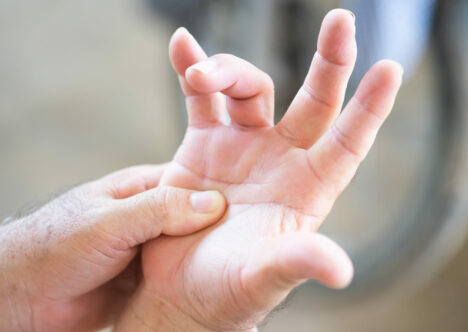Use our convenient online scheduler to book an appointment now.

How to Prevent Arthritis in the Wrist at Town Center Orthopaedics
Many people have little aches and pains that go away after a few minutes. Lifting grocery bags, working in the garden, or even sitting at the computer can take a toll on our joints, leaving us with an achy wrist and stiff fingers.

But what about when the pain won’t go away, or when you have pain and swelling in your joints? Those symptoms could be signs of arthritis in the wrist. And arthritis can strike people of all ages — young and old alike.
When those pains start to become part of your daily life, it’s time to see a specialist. A proper assessment, diagnosis, and treatment plan are crucial to slowing the progress of arthritis and avoiding a lifetime of pain and joint damage.
What Is Arthritis?
Arthritis is a general term that describes swelling, pain, or inflammation in the joints. You can experience arthritis in the wrist, shoulder, hips, or any other joint in the body.Arthritis Signs and Symptoms
There are four tell-tale signs of arthritis. If you experience any of these symptoms, it may be time to talk to a specialist:
- Pain. Arthritis pain may be steady or intermittent, and can sometimes occur while you’re simply resting and not using the joint at all.
- Swelling. Look out for swelling accompanied by skin that becomes red or warm to the touch, and keep the ‘Rule of 3’ in mind: if the swelling lasts longer than three days, or happens more than three times in a month, see your doctor.
- Stiffness. Stiffness after holding a prolonged posture (like sitting at your desk), or morning stiffness that lasts longer than an hour are both reasons to suspect arthritis.
- Difficult joints. Difficulty moving your joints (for example, when getting up off the sofa), loss of function, or feeling like your range of motion is limited are common signs of arthritis.
Common Types of Arthritis
The two most common types of arthritis are osteoarthritis and inflammatory arthritis. Osteoarthritis occurs most frequently in the hands, knees, and hips and affects more than 32 million adults in the United States. This is the “wear and tear” type of arthritis that is so common in older adults.
Inflammatory arthritis is characterized by inflammation. One of the more common forms of this is rheumatoid arthritis (RA). In RA, the body’s immune system attacks the joints, often in the hands, wrists, and knees. This causes pain and swelling, loss of motion, and damage to the joints.
Some medical conditions can cause arthritis as well, including fibromyalgia, lupus, and Lyme disease.
How to Prevent Arthritis In the Hands and Wrist
There are dozens of bones in the hand and wrist, each protected and separated by cartilage. When that cartilage breaks down, it can lead to painful contact between the bones. Cartilage breakdown is a trademark of osteoarthritis, though fractures, dislocations, and infections can also cause arthritis in the wrist and hands to develop.
However, there are steps you can take to prevent some types of arthritis from developing.
- Stay active. Practice range-of-motion exercise to keep joints loose.
- Stretch your joints. Perform simple wrist and finger exercises to prevent stiffness.
- Rest painful joints. If you feel aches and pains in a joint, give it a rest.
- Avoid pain triggers. If certain activities regularly cause joint pain, try to avoid them.
- Stop smoking. Smoking can inflame tissue and aggravate arthritis symptoms.
- Maintain a healthy weight. Carrying extra weight can increase stress on your joints.
Arthritis Care at Town Center Orthopaedics
If you’re experiencing pain and stiffness in your hands and wrists, the specialists at Town Center Orthopaedics can help. Our occupational therapists are certified hand therapists and will work with you to relieve pain and joint damage caused by arthritis.
Call (571) 250-5660 today or request an appointment.
Join our Mailing List
TCO provides patients with orthopedic problems the trusted resources and patient-centered advice they need to “Feel Better. Move Better. Be Better.”
© 2024 Town Center Orthopaedics | All Rights Reserved


